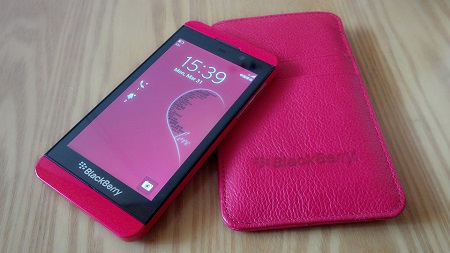CEO John Chen did everything he could think of to keep them going, but has finally admitted defeat.
BlackBerry smartphones were once the “it” devices. People loved them so much they were called “crackberries.” Where we see iPhones and Samsung Galaxy phones today, the Canadian handset maker once held a tremendous segment of the market.
Since then, BlackBerry fell from its high throne and has been plummeting for years.
Industry experts have been predicting the demise of BlackBerry smartphones for quite some time. At the same time, the struggling company was determined to keep trying, particularly when John Chen took over as CEO. Chen was quoted repeatedly saying that the brand would not give up on hardware.
 In a dramatic turnaround attempt, BlackBerry released one mobile phone after the next. They launched the Passport, a unique square-shaped device, and several others. They even released mobile devices based on Google’s Android operating system instead of the company’s own proprietary OS.
In a dramatic turnaround attempt, BlackBerry released one mobile phone after the next. They launched the Passport, a unique square-shaped device, and several others. They even released mobile devices based on Google’s Android operating system instead of the company’s own proprietary OS.
BlackBerry smartphones will no longer be designed, ordered or sold following this fiscal year.
In a press release, Chen announced the end of the company’s 20 year effort in the mobile hardware marketplace. The company first started in mobile devices in 1996 when it was selling two-way pagers. “The company plans to end all internal hardware development and will outsource that function to partners,” said Chen.
This announcement was made closely on the heels of its quarterly revenue report. Investors clearly saw potential in BlackBerry’s intentions to give up smartphones. Despite the notable drop in quarterly revenue, the announcement of the cessation of its hardware production and sales caused shares to climb 3 percent in premarket trading.
The company also announced that BlackBerry smartphones will continue to exist in some markets. This will occur through a royalty-collecting licensing agreement through the PT BB Merah Putih joint venture. That project is led by PT Tiphone Mobile Indonesia Tbk, the biggest wireless carrier in Indonesia. It will produce BlackBerry branded mobile phones running on Android. The mobile devices will be distributed exclusively within Indonesia. At the moment, no other market will see the sale of devices under this brand.
As its handset sales remain lower than the Canadian company had hoped, it has slashed 200 jobs.
The restructuring strategy at BlackBerry has been continuing and, on the heels of a job cut affecting 200 people, the struggling Canadian handset manufacturing is now directing its attention toward software.
The company barely has any mobile device models left on the market shelves and their sales simply aren’t cutting it.
Because of this, BlackBerry appears to be shifting its focus in order to send its resources in the direction of mobile apps for consumers and services for businesses – areas in which the company has managed to excel, over the years. The market share of global smartphone sales currently held by the Canadian mobile device maker is a measly 0.3 percent (as of the third quarter of 2015), according to data from Gartner. That said, when it comes to business security software and other forms of applications, the brand is managing to steadily improve its position.
Even the switch that BlackBerry made to Android does not appear to have been enough to boost its smartphone sales.
 John Chen, CEO of the company, announced that the company didn’t intend to step away from hardware and, as a part of that strategy, the company released the Priv smartphone, which was based on Android instead of on its own proprietary operating system. The hope was that the more popular mobile platform, in combination with the exponentially larger availability of mobile apps, would be enough to draw consumers back to the brand. Unfortunately, while it did see an increase in sales, it doesn’t look as though it was enough to rescue its hardware business.
John Chen, CEO of the company, announced that the company didn’t intend to step away from hardware and, as a part of that strategy, the company released the Priv smartphone, which was based on Android instead of on its own proprietary operating system. The hope was that the more popular mobile platform, in combination with the exponentially larger availability of mobile apps, would be enough to draw consumers back to the brand. Unfortunately, while it did see an increase in sales, it doesn’t look as though it was enough to rescue its hardware business.
The device, itself, is quite unique, and it isn’t difficult to see why the company would feel that it had draw for consumers. Its large 5.4 inch touchscreen also offered a slide-out physical keyboard, for users who would prefer the ease of a mechanical way to type. Its 18 megapixel primary camera (which also allows for 4K video recordings) featured autofocus and an image stabilizer. It is NFC technology enabled and offers about 22 hours of battery with standard device usage. It also comes pre-loaded with security and privacy apps. Its retail US price is $699.
That said, while it doesn’t look like BlackBerry has reached the point where it is phasing its smartphones out of production, predictions look as though its hardware options are going to become slimmer as the year progresses.
 In a dramatic turnaround attempt, BlackBerry released one mobile phone after the next. They launched the Passport, a unique square-shaped device, and several others. They even released mobile devices based on Google’s Android operating system instead of the company’s own proprietary OS.
In a dramatic turnaround attempt, BlackBerry released one mobile phone after the next. They launched the Passport, a unique square-shaped device, and several others. They even released mobile devices based on Google’s Android operating system instead of the company’s own proprietary OS.
 John Chen, CEO of the company, announced that the company didn’t intend to step away from hardware and, as a part of that strategy, the company released the Priv smartphone, which was based on Android instead of on its own proprietary operating system. The hope was that the more popular mobile platform, in combination with the exponentially larger availability of mobile apps, would be enough to draw consumers back to the brand. Unfortunately, while it did see an increase in sales, it doesn’t look as though it was enough to rescue its hardware business.
John Chen, CEO of the company, announced that the company didn’t intend to step away from hardware and, as a part of that strategy, the company released the Priv smartphone, which was based on Android instead of on its own proprietary operating system. The hope was that the more popular mobile platform, in combination with the exponentially larger availability of mobile apps, would be enough to draw consumers back to the brand. Unfortunately, while it did see an increase in sales, it doesn’t look as though it was enough to rescue its hardware business.